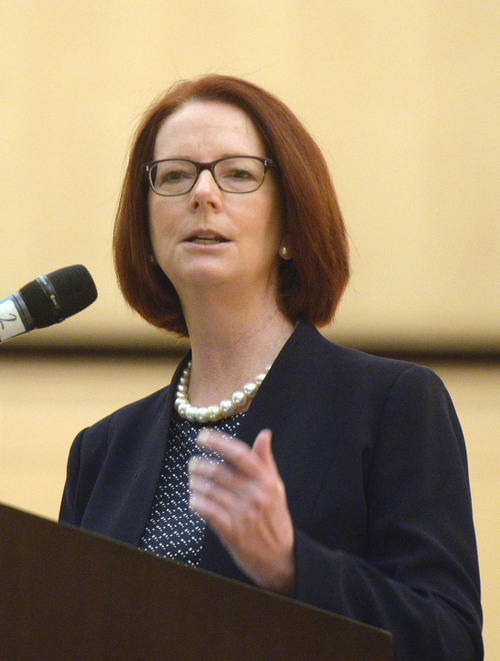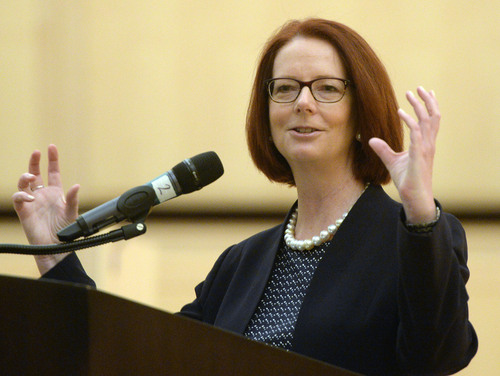This is an archived article that was published on sltrib.com in 2014, and information in the article may be outdated. It is provided only for personal research purposes and may not be reprinted.
Superpowers have it easier than their small neighbors, according to former Australia Prime Minister Julia Gillard.
On the eve of a vote to decide Scottish independence from the United Kingdom, the former Australian leader told an audience at the University of Utah Wednesday that "it's a pretty hard, old world for small nations."
"There is something good about being of a certain scope and size in the global economy and international affairs in the world we live," Gillard said.
Gillard spoke at a World Leaders Lecture hosted by the Tanner Humanities Center that focused on the changing scope and size of world nations and particularly China's economic strides in Asia.
She said that growing up in Australia, Asia was typically viewed as a place of poverty and a source of threat. But as the gross domestic product of China is poised to overtake that of the United States, she said those attitudues now belong to a bygone era.
"Asia's rise is the opportunity of this century," she said. "In the last 25 years, the economy of China, a nation of 1.3 billion, has grown by 20 times over. This is industrialization at warp speed."
She said that Australia benefits from an "advantage of adjacency" to China, which is now Australia's biggest customer of exported Australian goods.
But she added that Americans should not feel depressed about being relegated to second place in the global economy, but instead should see Asia's gains as a boon to political innovation and entrepreneurial opportunities.
"In the 21st Century, competition will be fiercer," Gillard said. "Getting even better at what you do, ever more productive, does not happen without government acting with purpose, unfettered by gridlock."
Gillard noted the differences between politics in the United States and the political climate of Australia, where voter participation is mandatory.
She said that Australians typically hold a view that government can and should work efficiently, whereas Americans are more skeptical of the ability of government to solve problems.
"Our politics is necessarily about the mainstream," she said. "Your politics, because you've got the need to get the vote out. There is a value to highly motivated minorities that is not replicated in Australian politics."
David Chapman, an emeritus professor in the U.'s Geology and Geophysics department, said the lecture was a rare opportunity to hear a world leader.
And Bob Goldberg, director of the Tanner Humanities Center, said he was pleased with the audience engagement during the lecture series, currently in its eighth year.
"What we're trying to do is bring people to Utah who Utahns are not going to see very often and to have this kind of personal relationship or personal interaction with somebody who is what we call a global citizen, someone whose opinions, ideas and values shape the world we live in," Goldberg said.





